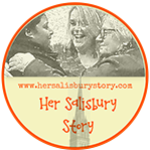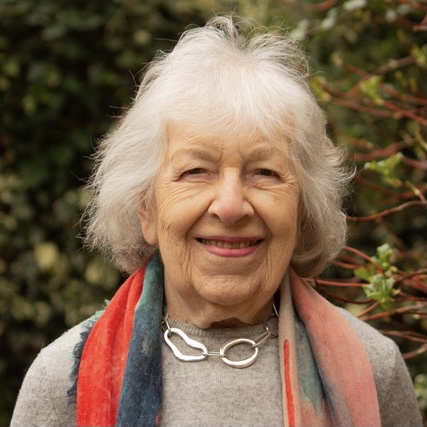Phyllis’s Story as told to Jean Lunnon
Introduction
Phyllis has been an extremely active volunteer for several organisations in Salisbury for over three decades. In 2012 she received a ‘Local Hero Lifetime Achievement Award’ for her work with the Salisbury Trust for the Homeless, and in 2013 she was entered on the University of the Third Age (U3A) National Roll of Honour. Phyllis continues to play an active role in the life of the city. Her journey through life started some distance from here however, in North Devon.
.
Early years
When and where were you born?
I was born in 1925 with a twin brother in Bideford, North Devon, where wildflowers grew in profusion and freshly-caught fish came straight into the quay. I went to the local girls’ Methodist College and then in 1942 to Exeter University, reading Geography and Biology. My father and many of his family were teachers and I was encouraged to follow my older female cousin who had graduated from Exeter and was already teaching.
What was it like being at university during the war? Was there equality for men and women undergraduates in the 1940s?
University during the war was very different. The sexes were imbalanced but because of World War II we were practically all females. All the boys were called up to join the Forces at 18. There was a precocious 16-year-old, a few men medically unfit and soldiers on a six-month short course from the Signals Corps stationed nearby who attended during the day. Not much scope for finding a boyfriend!
Teaching and travel
What was your first job?
After university I longed to travel, but I needed teaching experience, so I found a post in the Potteries in the Black Country, as a contrast to idyllic Devon. A pall of smoke and a covering of soot lay over everything, but the people were lovely.
Did you fulfil your dream of travelling?
In 1949, at the age of 24, I sailed to Jamaica, where I taught in a government girls’ grammar school for three years and built strong relationships with the islanders.
I had to commit to a three-year stay to have my sea passage paid for – two weeks across the Atlantic. No flights then so no home visits. That was an adventure, going where I knew no-one. Actually it was heaven after austerity Britain where food was still rationed.
I taught in the only girls’ grammar school on the island, though there was a comparable boys’ school and several very good private secondary schools. Consequently the fees were minimal and many paid for by local professional and business men.The girls came from working class families and were excellent students, moving on to useful posts in the town. One of my Sixth Form became Headmistress and celebrated the 50th anniversary of the school, which I attended.
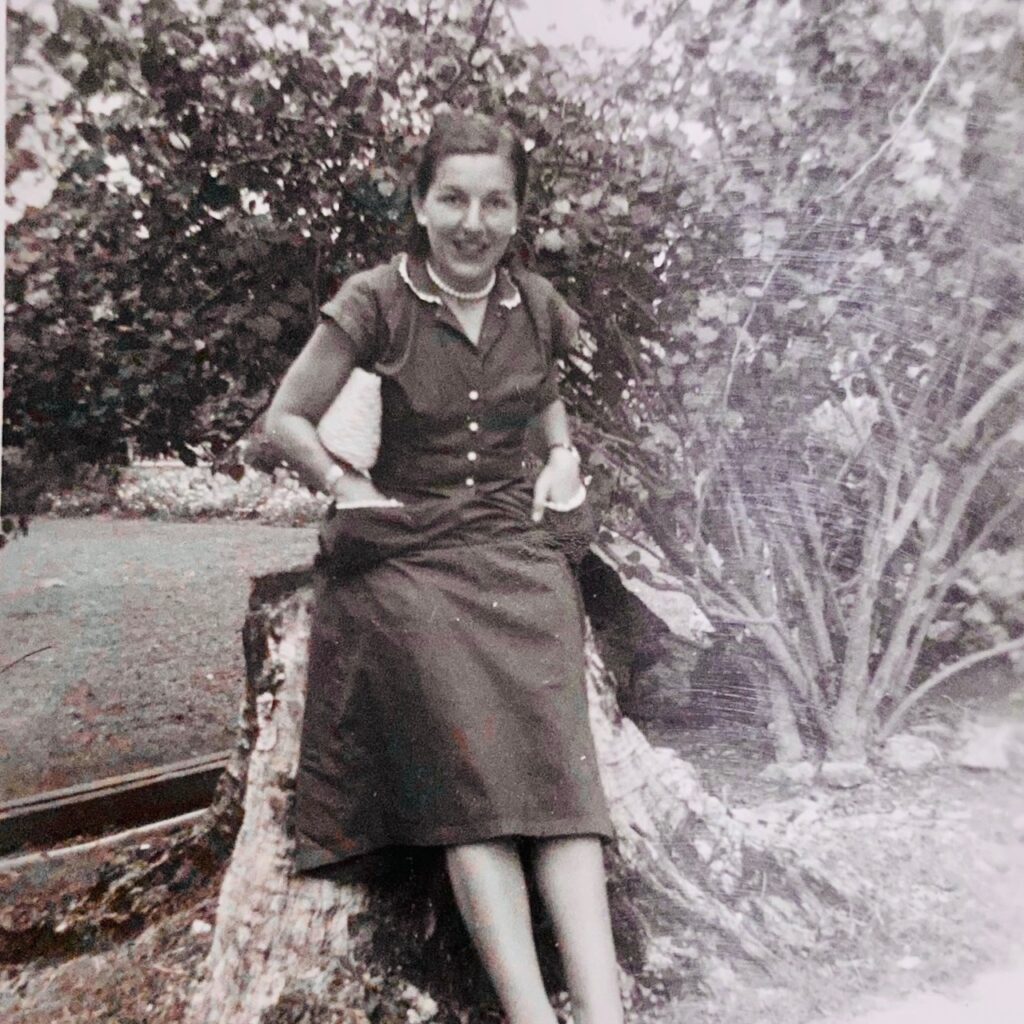
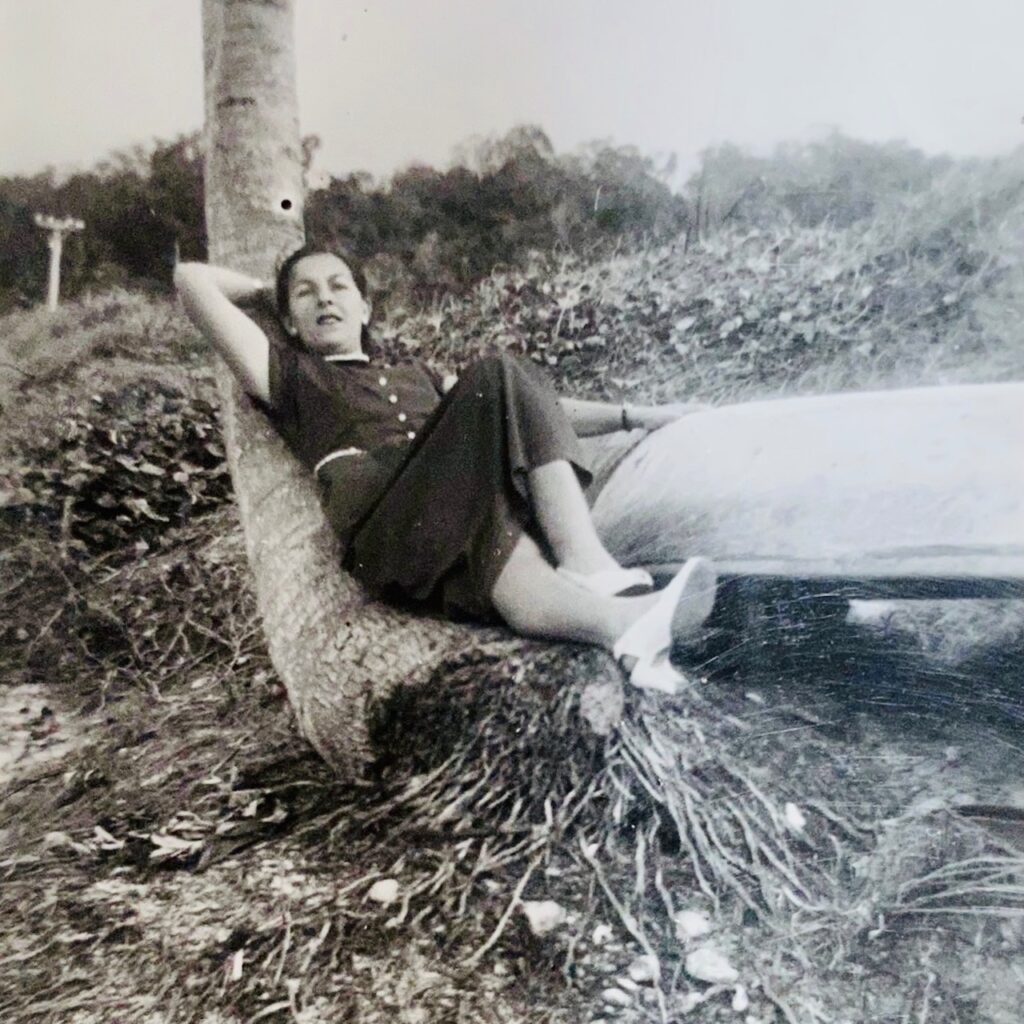
What did you decide to do at the end of your three year contract?
After a brief spell back in England, I took off again for British Columbia and enjoyed the coast and mountains as well as a great social and artistic life. The first year I spent teaching in Prince George, then a frontier town. There was no thaw that winter and the temperature dropped to -40C. Half the children had unstable backgrounds and life was tough. Later in Vancouver I worked as librarian for a government Commission to restore the sockeye salmon, and enjoyed everything the city had to offer.
I then returned to England, where I looked after my disabled mother until she died 24 years later
How did you feel about that? Were you able to continue your teaching career?
Despite my caring responsibilities I was able to keep on with my teaching career. I was very fortunate to get a teaching job in my old school in Bideford, but I did feel trapped. Joining the North Devon Yacht Club helped. I had terrific fun racing my yacht Wayfarer 14. I was Secretary for three years and then Rear Commodore. After 11 years I escaped to become Head of Science in a new Comprehensive in Bath, still returning home most weekends. I had a top floor flat in the famous Royal Crescent – lovely views but not always practical living. The last six years I was back in Bideford, this time teaching in a boys’ school.
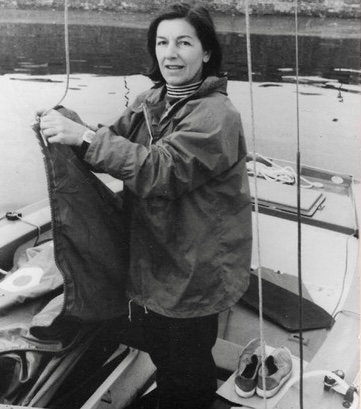
What changes did you notice in conditions for women teachers over the decades?
During my long career conditions for women teachers changed substantially. In the 1920s and 30s, in single sex educational establishments women were equal to men in their achievements and pay. This was particularly true of grammar schools, where each level of staff had its equivalent in the brother/sister school. This gave great opportunity to many unmarried women between the two Great Wars when they so outnumbered men. However, in those days, any woman who married had to give up her job. Once Comprehensive mixed schools appeared after the war, most of the senior posts were taken by men, while women became the Deputies, in charge of the interests of the girls.
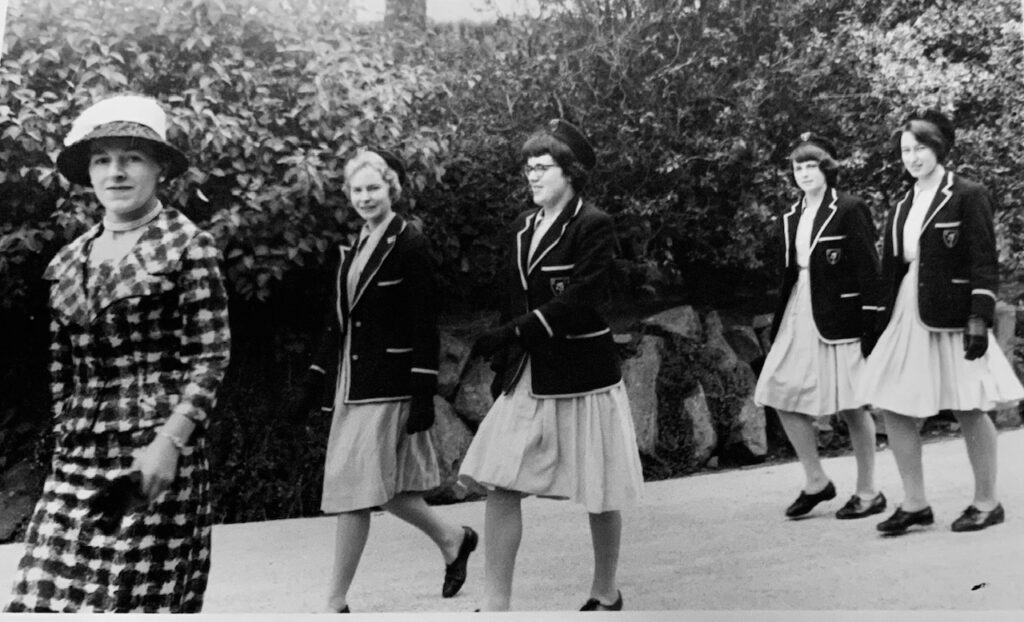
Probation & Victim Support
What was your first venture into the voluntary sector?
In 1986 I retired and made my first foray into the voluntary sector working with teenage boys in the Barnstable Probation Service.
Why did you choose Salisbury as your home for retirement?
I used to visit a friend from college in her family’s farming estate near Sixpenny Handley. I found Salisbury to be a beautiful city, on the level (for my old age), with London easily accessible.
How did you continue with your volunteer work in Salisbury?
I moved to Salisbury in 1987. For 10 years I took notes of Court proceedings for Probation Officers who had to deal with more than one court at a time. I started in the Magistrates Court, then progressed to the Crown Court. Also, from 1992 to 1997, I volunteered with the Victim Support charity and helped raise over £5,000 by organising concerts, dinners, fashion shows, flag days and so on. One spring we had a Daffodil Dinner in the Ballroom at the Old Manor on the Wilton Road, with the well-known St. John Singers entertaining us.
I also arranged a County of Wiltshire Victim Support service in Salisbury Cathedral, attended by the Bishop, the High Sheriff and the chiefs of many County Departments. Esther Rantzen, then often on TV, gave the address from the pulpit. Unfortunately, our Social Worker, who knew all the answers to Esther’s questions, was not able to attend the reception after the service, as she was being interviewed by the BBC. We fundraisers felt very inept!
U3A
You have accomplished a great deal, all at the same time! Tell us about your work with the U3A.
In 1989 I joined Salisbury and District U3A and was Course Organiser from 1991 to 1994. As membership grew, I helped set up Sarum U3A and was Course Organiser there from 1994 to 1997, when I became Chairman for two years and then again from 2002 to 2004. In 1998 I helped set up a third local U3A, Spire, but I remained in Sarum. I also ran courses on the following topics: Architecture, Chinese ceramics, Genetics, Natural History…. And I set up a Sunday Lunch Club. All very enjoyable.
You were elected to the U3A National Executive Committee, what year was that?
In 1996, I was nominated by Sarum U3A for election, first for one year, then for a further three years from 1997 to 2000, serving as a Trustee for the Third Age Trust. I met the three U3A founders and made friends with people from all over the UK. I was on the Standing Committee for Education and was responsible for Subject networks, which trebled in number.
What other areas did you focus on at this time?
I was on the editorial panel for the national U3A ‘Sources’ magazine and persuaded David Ensor, a Salisbury U3A Chairman and a retired publisher, to edit it for a number of years. I also presented Membership Certificates to 14 new U3As in the South West. At one point I even went up to the BBC as a consultant for their daily TV ‘Art and Antiques’ programme.
What happened when you finished your term as trustee?
After I finished my term as a trustee I chaired the Online Courses Committee from its inception in 2000 until 2004, encouraging members to write and tutor courses for study online. Sometimes people would turn up out of the blue. I remember asking one man to drop into my office to chat it over. He turned out to be living in Berkeley, California! Two Spire U3A members wrote online courses: Sylvia Parrett on plants and Peter Read on digital photography. It not only took hours of time writing a course, but weeks of tutoring followed. I was always amazed at people’s dedication.
It sounds as if you were a pioneer when it comes to promoting the use of technology with in U3A?
I helped it along by organising a computer training day for the Wessex Region in Salisbury, with a grant from the Phoenix Fund. Forty people from various U3As turned up, anxious to learn the basics before laying down £1000 or more for equipment. There was a fault with the main projector, so we all had to crowd round a tiny screen. However, there was keen interest and eventually 25 Salisbury members purchased reconditioned computers from a local firm for only £95.
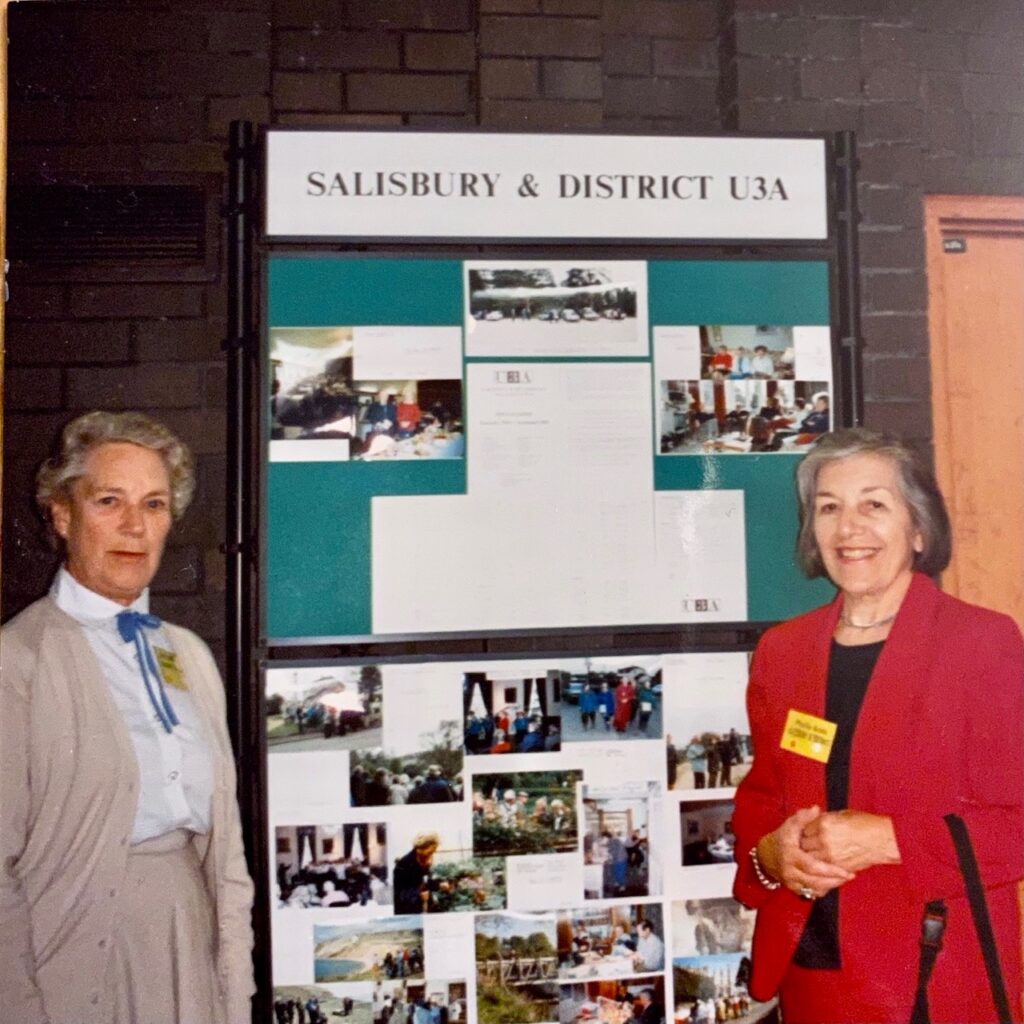
I gather you were also the instigator of U3A Summer schools?
I had run many Study and Leaders’ Days, mostly in London, and that gave me the idea of organising residential Summer Schools. The first one was in York in 1999. We kept the cost down to £100. I was so pleased that members came from every region of the UK except Northern Ireland. They have continued ever since, and now two national Summer Schools happen every year, held in a University or College, and many Salisbury members have enjoyed them.
No wonder you were nominated by Sarum U3A for the U3A Roll of Honour
I was delighted to accept the honour, but I feel I have gained far more than I have given.
Are you still active in the U3A?
Yes I have just finished running a Foreign Film Club, as I cannot see the English captions anymore and I am a hopeless linguist, which makes it rather hard to follow the plot! I still have a lovely long-running Book Club. The discussions are great because our opinions are so diverse. There are also two Sunday groups meeting for lunch and coming back to my house to watch an iconic film. During the Covid-19 Lockdown, I have managed to keep the groups going to some extent through emails and phone calls, watching TV films and sharing views.
Salisbury Trust for the Homeless (STFH).
As well as your involvement with the U3A, you became heavily involved with the Salisbury Trust for the Homeless (STFH). How did that come about?
In 1998 I bumped into the chairman of STFH who asked me to take a share of sleeping at the Night Shelter to assist the manager, which I did for a couple of years. I was glad to help difficult boys who society could not cope with. We could take both sexes but there were very few women who were homeless. In 2002 I joined the STFH committee and organised bookstalls to raise funds. I was elected Chair of Trustees from 2004 to 2009. We increased our rented accommodation for homeless people and bought two houses, making a total stock of 9, holding over 30 people. They could stay for up to two years, working with our professional staff to overcome their difficulties and live independently again.
How did the STFH develop further?
In 2008, STFH became a Company LG, (Limited by Guarantee) and was affiliated to BCHA (Bournemouth Churches Housing Association). From then on I chaired the Salisbury fund-raising committee and eventually we raised a quarter of a million pounds to restore alms houses next to St. Paul’s Church for use as long-term accommodation.
We raised money by inviting individual supporters to donate and approaching many local and national charitable organisations for grants. Over the decades I have organised many events in and around Salisbury: concerts, visits, coffee mornings, soirees, dinners, garden parties, quizzes, sponsored walks and cycle rides, auctions, photography competitions, market stalls….
What’s your experience of living in Salisbury?
I love living in Salisbury because it is such a friendly place and there are so many things to do here and always someone to do them with. I am very comfortable in my house and garden. Salisbury has been a perfect choice for my retirement.
